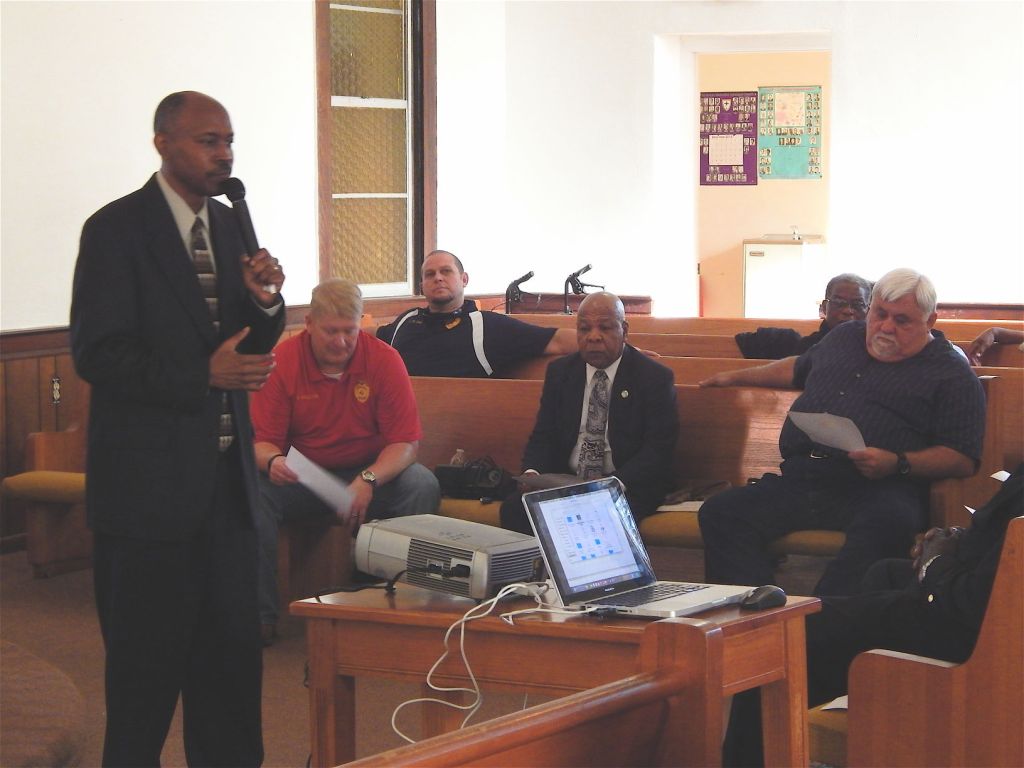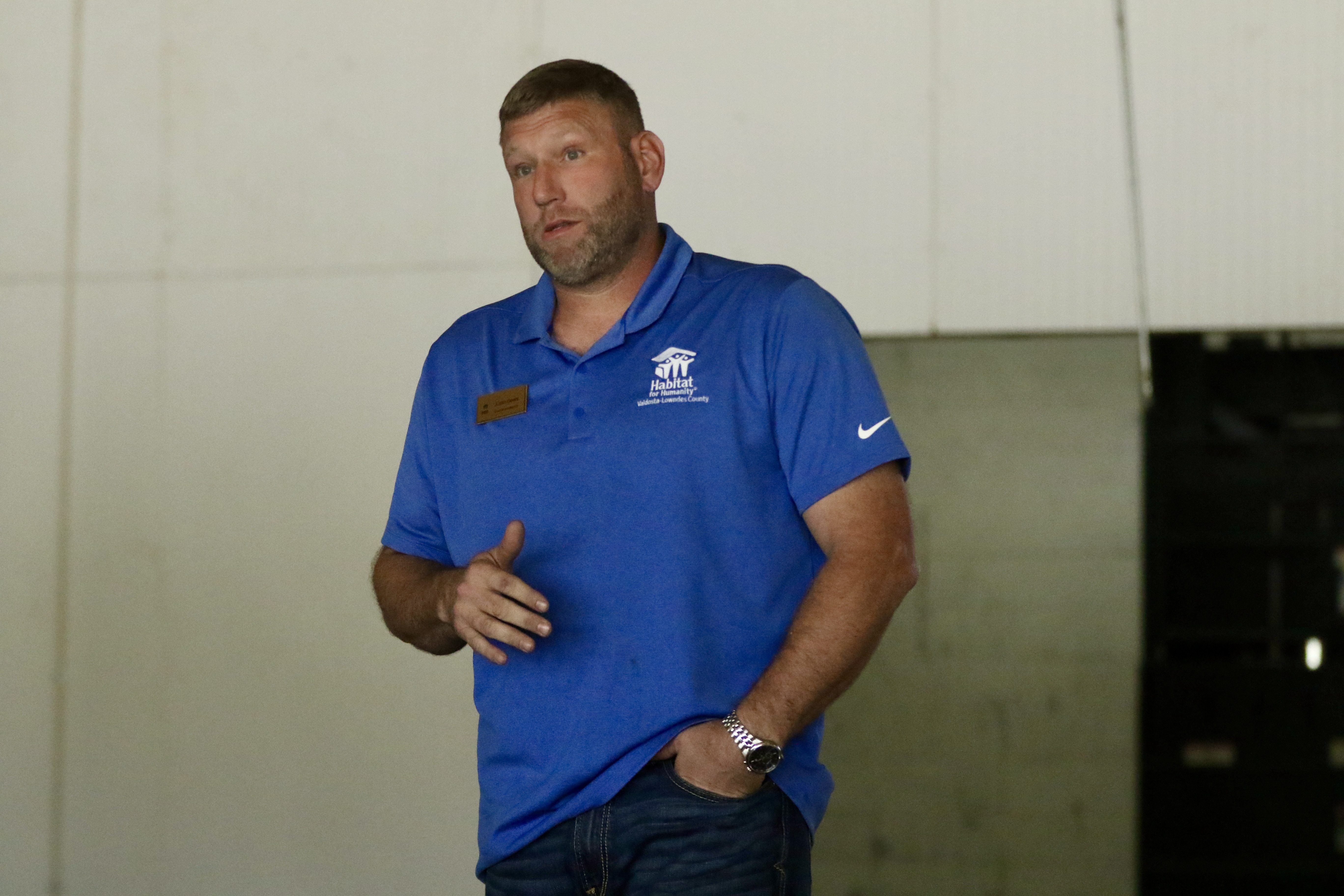Community forum addresses law enforcement, minority relationships
Published 12:00 pm Wednesday, June 17, 2015

- Reverend Albert Bivens Jr., far left, of the Greater New Bethel AME Church opens up a community forum between citizens and law enforcement. Suwannee County Sheriff Tony Cameron, far right, and Live Oak Police Chief Buddy Williams, second to left, represented their agencies at the forum.
Citizens and law enforcement officers gathered at Greater New Bethel AME Church in Live Oak Thursday, June 11, for a community forum entitled “A Different Headline” that addressed the relationship between law enforcement and minorities. The forum, presented by the Suwannee North District of the AME Church, was a proactive response to recent national headlines about young African-American men, such as Eric Garner, Michael Brown and Freddie Gray, who were killed directly by or through the actions of police officers. Their deaths received extensive media attention and led to major unrest in the cities where the incidents occurred, spurring national movements and dialogues like Thursday’s event.
Greater New Bethel AME’s Reverend Albert Bivens Jr. introduced the forum’s local law enforcement representatives, Suwannee County Sheriff Tony Cameron and Live Oak Police Chief Buddy Williams.
“It seems every time you turn around you’re running into these different stories in the media,” Bivens said. “If we can get a different headline, I believe we’ll have a different story, and if we have a different story, we’ll have a different end. Because the ends we’re having right now are just not acceptable.”
Moderator and retired Florida Highway Patrol Trooper Nicholas Causey led the discussion, proposing questions to Cameron and Williams and engaging audience members to share their stories and ask their own questions. Issues like diversity training, racial profiling, demographic equality in the workforce, public relations, body cameras, youth involvement and public accountability were tackled.
The SCSO and LOPD undergo sensitivity and diversity training, according to both leaders. Diversity is important to keep in mind because every single person is different from everyone else, Cameron said.
“The training reminds deputies to be open, listen to everyone’s side of the story and be sensitive to everyone’s feelings in the situation,” Cameron said.
In response to a question regarding racial profiling, Cameron noted that arrest demographics are usually dictated by the community as crime trends change over time. Williams believed the LOPD’s traffic citation data matched up to the demographics of the area. Causey questioned whether the SCSO and LOPD’s workforce matched up to local demographics as well. Cameron said it would in a perfect world, but it is hard to find enough minorities to patrol, which is the most visible post for deputies. Because of this, it appears like there are few minorities working for the SCSO when there are actually several in other posts, Cameron said.
“The difficulty is in finding minorities interested in law enforcement,” Williams added. “I don’t want to hire someone just because of the color of their skin. We need to actively recruit minority officers, but we’re raising a generation of young people who are losing any connection to law enforcement.”
Cameron believes current events such as the police shootings are also holding many people back – not just minorities – from a career in law enforcement.
“Folks look around and think, ‘I don’t want to get involved in this,’” Cameron remarked.
Causey brought up one of Suwannee County’s more unfortunate claims to fame: a recent alleged racism incident at a local hotel. SCSO deputies reportedly informed the chaperones of a group of African-American teens on a college tour that the area was not particularly accommodating to “you all,” inferred to mean black people, after the group experienced some harassment at the hotel they were staying in.
Causey asked Williams and Cameron if their agencies had any sort of public relations specialist to address situations like the hotel incident. Williams said he performs those duties as best he can through social media and tries to spread positivity on sites like Facebook. Cameron said he is not much of a social media user but he does monitor sites for information and feedback. He emphasized the importance of media outlets getting the whole story, pointing out a television news story about the hotel incident in which his 15-minute interview was cut to about 15 seconds.
Cameron and Williams were asked if their agencies had citizen review boards for oversight of police happenings. The SCSO and LOPD don’t have those, they said, but community leaders like NAACP President Alonzo Philmore meet with them regularly to discuss issues or ask questions.
The agencies also monitor their daily operations through dispatch records and other reports, Cameron and Williams said. Williams stated the LOPD will soon be implementing body cameras, which will record specific interactions between law enforcement and citizens or suspects. The cameras will not run for the entirety of an officer’s shift, he said, and would provide accurate evidence of an event along with officer accountability.
The SCSO is not implementing body cameras, but they will be ready to do so when – not if – it becomes state mandated, Cameron said. He expressed concerns over whether the videos would be considered public record and whether the cameras would further erode trust between citizens and law enforcement.
One of the last topics of “A Different Headline” was about youth. A 21-year-old woman in the crowd said she and many in her generation do not trust police to help them and asked Cameron and Williams how police can gain the younger generation’s trust back.
“The biggest thing is trying to get back into communicating,” said Williams. “It’s through social media, community involvement and open forums like this that you have the most success. We’ve got to reach out to our younger generation and try to salvage what’s ahead of us.”
Programs like the SCSO’s Police Athletic League and LOPD’s Teen Academy reach hundreds of children and young men and women every year, Cameron and Williams explained. Establishing relationships and maintaining positive communication ultimately helps build trust between youth and law enforcement, they said.
While the evening’s main focus was on the relationship between law enforcement and the community, particularly minorities, the discussion also touched on an even deeper issue: racism.
At the forum, Reverend Tan Moss of the AME Church provided his thoughts on why race is still an issue today and what can be done to make it a thing of the past. He believes negative stereotypes were created about African-Americans during America’s slavery era in order to justify the practice of slavery, and those stereotypes have been embedded in our culture ever since. Moss said those stereotypes are drawn upon when people of the same race are involved in an altercation as well as when different races are involved.
“This idea of helping police officers do their jobs with equality and justice is much bigger than the local sheriff’s office or police department,” Moss stated. “It is a cultural issue. It really involves us shedding these discriminatory ideas and really just getting to know each other. We’ve got to co-mingle in our communities and in our schools so when we encounter each other, those stereotypes won’t automatically pop in our heads.”





